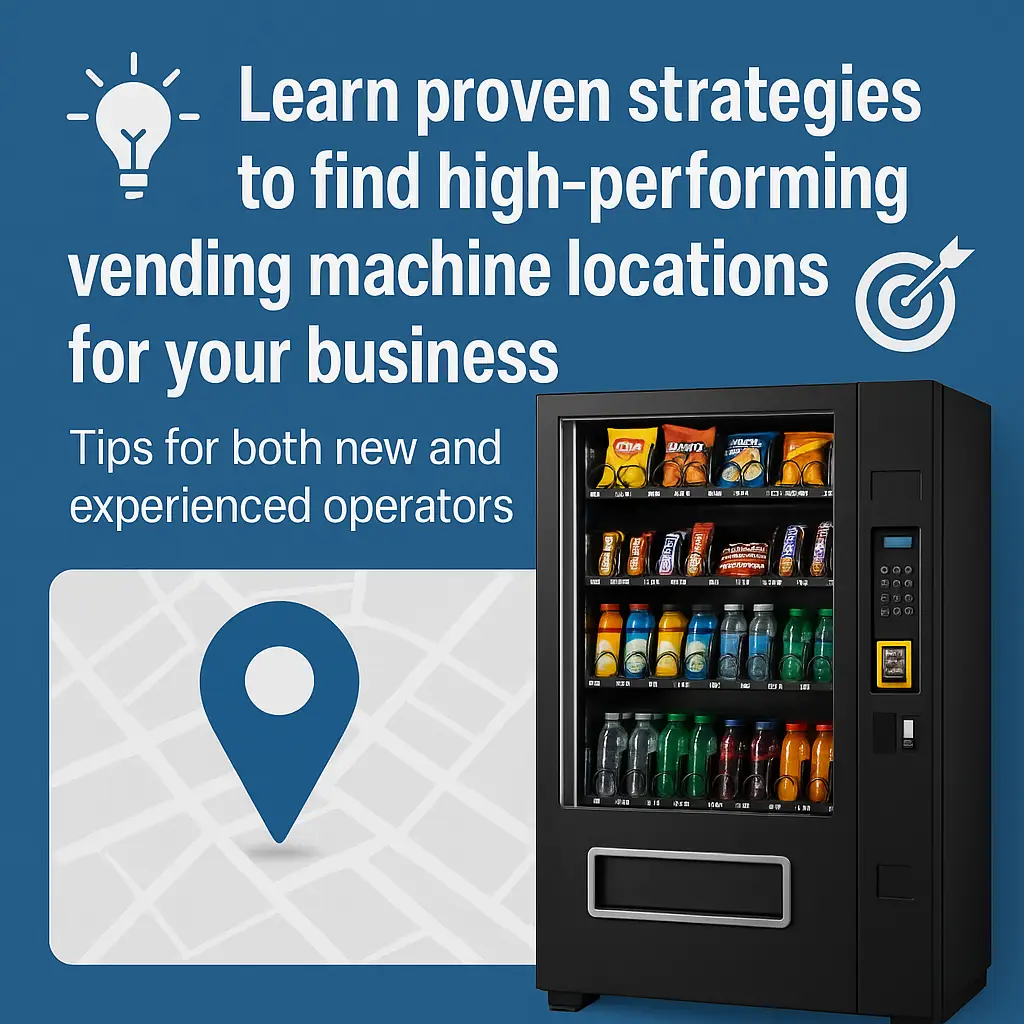How to Find Vending Machine Locations That Earn
Learn proven strategies to find high-performing vending machine locations for your business. Tips for both new and experienced operators.
Back to Vending Machine Locators ResourcesLearn proven strategies to find high-performing vending machine locations for your business. Tips for both new and experienced operators.
Back to Vending Machine Locators ResourcesStart your 30-day free trial and get instant SMS and email alerts whenever a local business needs vending service. These are real location leads to help you grow your route — you decide which ones to buy, no obligations or contracts.
![]() Location type affects vending machine profitability and traffic
Location type affects vending machine profitability and traffic
![]() Foot traffic is more important than just visibility
Foot traffic is more important than just visibility
![]() Understanding customer needs increases product turnover and revenue
Understanding customer needs increases product turnover and revenue
30 days free, then $39 / month.
No Commitment. Cancel Anytime.

Finding the right vending machine location can make or break your vending business. Whether you're just starting out or looking to expand, identifying high-performing spots requires strategy, research, and persistence. It’s not just about placing machines anywhere — success comes from securing venues with consistent foot traffic and a clear need for accessible snacks, beverages, or meals.
Start by targeting locations where people spend time and have limited access to food options. Offices, manufacturing facilities, gyms, schools, and apartment lobbies are frequently visited and can provide steady sales. These environments typically have repeated daily traffic from individuals who are more likely to make impulse or convenience-driven purchases. The lunchroom at a medium-sized warehouse can outperform a more public but less predictable space like a lobby with low daily activity.
Next, look at location dynamics. High visibility doesn’t always mean profitability. Study movement patterns: Are there wait areas, breakrooms, or regular gathering points? Observe whether the venue has any existing vending machines, their condition, and restock frequency. A poorly serviced machine is often an opportunity to offer something better.
Once you’ve identified a potential spot, speak directly to the property manager or decision-maker. Be prepared to show the value of your setup — cleanliness, modern machines with contactless pay, healthier food options, and reliable service can all be strong selling points. In competitive areas, some vendors offer commissions, but most businesses prioritize convenience for their tenants or employees over small revenue shares.
Don’t overlook smaller or underserved venues. A well-placed combo machine in a small law office may pull more consistent sales than a crowded mall where purchases are unpredictable. Research helps you avoid overly saturated markets and guide your investment decisions.
If you're just starting out and need a full overview, check this guide on what to consider before launching your vending business. Also, don’t forget legalities — learn what permits and insurance you may need by reviewing the vending permits and insurance breakdown here.
Vending Exchange connects vending operators with real businesses actively looking for vending services—including traditional machines, AI coolers, and office coffee. Get instant SMS and email alerts when new opportunities are available in your area. No contracts or monthly fees—just buy the leads you want. Start your free 30-day trial today and grow your vending business on your terms.
Spend time observing foot activity during peak hours or request traffic data from the property. Look for daily routines or consistent usage.
Not always. If existing machines are broken, outdated, or poorly stocked, you may be able to replace or outperform them with better service.
Workplaces with limited food access, schools, gyms, and apartment buildings tend to perform well due to consistent, predictable traffic.
Public locations often require permits and may have strict regulations. Private properties like offices or gyms are usually easier to secure.
Reach out to property managers, business owners, or HR representatives — they often control vendor contracts and amenities.
Highlight benefits such as free installation, contactless payments, healthy options, and reliable restocking to show immediate value.
Some locations ask for commissions, but many prioritize convenience and service. Always assess costs and revenue before offering one.
Yes, especially in schools or public facilities. Be sure to check with local regulations and secure proper licenses before installation.
Reevaluate your site criteria, product mix, and customer behavior. Sometimes moving a machine to higher-traffic spots yields quick improvements.
In-person visits work best, but if unavailable, follow up initial emails with phone calls to increase your chance of landing a placement.